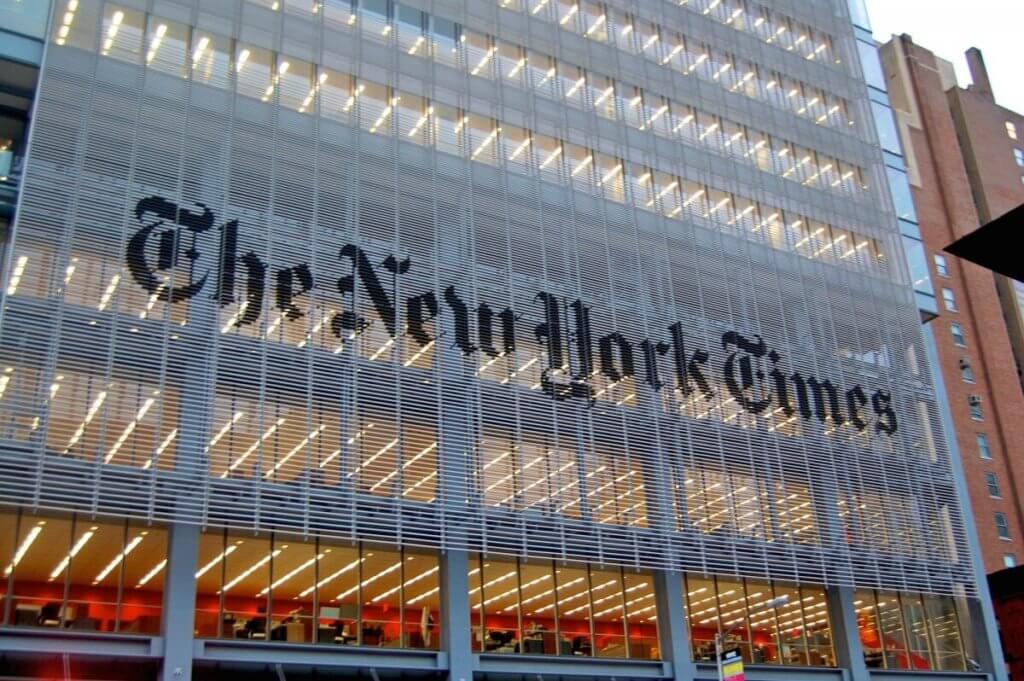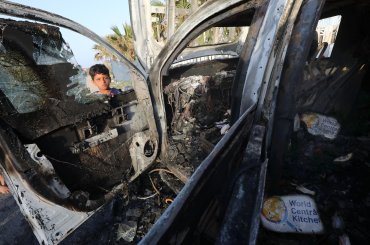If you look for them, you can find good articles in The New York Times. This was a good article about Syria that came out in the NYT two years ago. “Aleppo After the Fall,” by Robert F. Worth. Here is an excerpt:
It is impossible to live in government-controlled Syria without noticing that there are almost no young men on the street. They are in the army, or they are dead. Veterans must carry their military papers with them or risk on-the-spot re-enlistment. At one checkpoint, government soldiers tried to grab the young Spanish photographer I was working with, who is easily mistaken for a Syrian; they wanted to recruit him. In Latakia, a beach town in the regime’s northwestern heartland, I met a 53-year-old businessman named Munzer Nasser, who commands a militia composed almost entirely of older men; there are no young men left in his village. One of its members, he told me, is a 65-year-old whose three sons have all been killed in the war. Behind the Assad regime’s atrocities lies a fear of demographic exhaustion. Its rebel opponents have no such worries: They can draw on a vast well of Islamist sympathizers across the Arab world.
These facts translate into a genuine gratitude — in regime-controlled areas — toward Russia, whose military intervention in late 2015 may have forestalled a total collapse. Many Syrians say they feel reassured by the sight of Russian soldiers, because they (unlike the army and its allied militias) are not likely to loot or steal. Some of my contacts in regime-controlled areas are even learning Russian. In Latakia, some people told me that their city might have been destroyed if not for the Russians. The city has long been one of Syria’s safe zones, well defended by the army and its militias; there are tent cities full of people who have fled other parts of the country, including thousands from Aleppo. But in the summer of 2015, the rebels were closing in on the Latakia city limits, and mortars were falling downtown. If the rebels had captured the area — where Alawites are the majority — a result would almost certainly have been sectarian mass murder. Many people in the region would have blamed the United States, which armed some of the rebels operating in the area. In this sense, the Russian intervention was a lucky thing for the Obama administration too. Andrew Exum, who worked in the Pentagon at the time, told me that the military drew up contingency plans for a rapid collapse of the regime. The planning sessions were talked about as “catastrophic success.”
Worth’s piece should be read in full. He is critical of all sides, but as you can see in the excerpt above, he is honest about some of the people the United States armed. They would have committed genocide if they had won and the U.S. had a backup plan (presumably invasion) if the Assad government had collapsed.
But now the NYT is trying to cover up the fact that the US supported people who fought side-by-side with genocidal killers and might have been genocidal killers themselves. This ran last week, “Kurds’ Sense of Betrayal Compounded by Empowerment of Unsavory Rivals.” Excerpt:
Now, a week after President Trump’s decision to pull American support from them, the sense of betrayal among the Kurds, trusted allies now being forced to flee under assault from Turkey, is matched only by their outrage at who will move in: Turkish soldiers supported by Syrian fighters the United States had long rejected as extremists, criminals and thugs….
More–
Early in the war, when the United States still hoped that Mr. al-Assad would fall, the military and the C.I.A. sought to train and equip moderate, trustworthy rebels to fight the government and the Islamic State.
A few of those now fighting in the northeast took part in those failed programs, but most were rejected as too extreme or too criminal. Some have expressed extremist sensibilities or allied with jihadist groups. The majority, though, have no clear ideology and turned to Turkey for a paycheck of about $100 a month.
Some have documented records of looting property, displacing civilians and committing other abuses during earlier Turkish-backed incursions into Syria. Fighters for many of the groups routinely chant racist slurs against the Kurds, Syria’s largest ethnic minority, calling them atheists or pigs.
Within days of Mr. Trump’s assent to the Turkish-backed latest advance, human rights groups accused the militias of indiscriminate attacks on residential areas and killing civilians, including a prominent Kurdish politician.
“They are basically gangsters, but they are also racist toward Kurds and other minorities,” said Elizabeth Tsurkov, a fellow at the Foreign Policy Research Institute. “No human should be subjected to their rule.”

Now here is columnist Nicholas Kristof, who has his own morality play to narrate, “Trump Takes Incoherence and Inhumanity and Calls It Foreign Policy.” It was published on Sunday. Short excerpts:
Trump has emphasized his desire to bring American troops home, and that’s a perfectly reasonable aspiration if undertaken in a prudent way. But even as Trump abandoned the Kurds and unleashed this disaster, he was actually increasing the number of American soldiers in the Middle East — sending some 3,000 additional troops to Saudi Arabia.
So we’re sending more troops to Saudi Arabia to help a misogynist dictatorship that kills a journalist for an American newspaper, even as we betray the Kurds who have been trying to build a democratic enclave that empowers women; we’re sending troops to Saudi Arabia to confront Iran, even as we give Iran a helping hand in Syria.
More from Kristof:
I began this column with a note of praise for Obama for confronting the Yazidi genocide and saving many lives. It’s also true that Syria was Obama’s greatest foreign policy failure, and I repeatedly criticized his passivity as hundreds of thousands were killed.
Yet at least Obama was always wrestling deeply with the issues, seeking out expert opinions and trying to make the most informed decisions possible. While I questioned his judgment on Syria, I never doubted his seriousness, compassion or integrity.
So according to Kristof, Obama merely stood by and had nothing to do with the hundreds of thousands killed. The aid given the rebels is totally erased from the record. So is the war in Yemen. For Kristof, the worst thing Obama did was not intervene in Syria. Of course he did intervene: He supplied weapons to the Free Syrian Army. And under Obama the US actively aided the Saudis in its genocidal bombing campaign in Yemen. So Kristof is whitewashing this too.
Now Kristof is only upset that we are confronting Iran in Saudi Arabia while indirectly helping them in Syria by withdrawing and forcing the Kurds to join up with Assad.
And of course there is nothing about the bombing in Gaza which the US supported. This is completely beneath Kristof’s notice.
Hat tip to Moon of Alabama and the Grayzone project, who both have more information on this. I realize that the left has been split on Syria and Assad. I think Assad and Russia have been guilty of massive war crimes, though Russia’s bombing has probably been less severe than ours. (See the Airwars site for information on the various bombing campaigns by the US and Russia.)
The mere mention of certain names or of criticism of this side or that in the Syrian War will bring forth heated reactions. But for those of us who are Americans the first concern should be our role and it is a simple fact that once again, the U.S. poured weapons into a conflict, with many of those we armed guilty of committing atrocities, atrocities that would have become genocide if they had won. The New York Times essentially admitted that in the piece by Robert Worth two years ago. What does one say about a term like “catastrophic success”?
But now the NYT is actively whitewashing our role with a childish piece of propaganda telling its readers we armed only honest trustworthy Boy Scouts, not these current horrible racist murdering dregs. The US would never arm anyone who didn’t live up to the highest moral standards. Look at the Saudis. Look at the Israelis.
Add to that countless other regimes and groups that we have armed. And look at what we have done ourselves in Raqqa and Mosul. For Kristof, nothing we did arming the Free Syrian Army even registered. He was honest about Yemen a year ago, but he has forgotten about that as well, almost certainly because it started under Obama and can’t be blamed solely on Trump. He mentions the murder of Khashoggi, probably because he worked for an American newspaper (something Kristof mentions explicitly) and because this occurred under Trump.
Trump is a horrible man in many different ways and deserves most of the criticism he gets, but much of the criticism he receives from liberals is opportunistic and hypocritical. Just as Trump could stand in the middle of Fifth Avenue and gun down a pedestrian with his base cheering him on, Obama actually did participate in arming the allies of Al Qaeda and in assisting in the bombing and starving of civilians in Yemen and Gaza without most liberals even noticing.



“And look at what we have done ourselves in Raqqa and Mosul”
The Sacking of Fallujah by Caputi, Hil and Mulhearn
“The Sacking of Fallujah offers a people’s history of the three sieges and related military assaults, launched against the Iraqi city of Fallujah by the US military and its allies. This timely and compelling combination of eye-witness testimony, historical documentation, and expert analysis is the first complete account of the sieges of Fallujah, from the two US-led operations in 2004 to the recent Iraqi-led operation to wrest control of the city from the Islamic State in 2016.
Distinguishing itself from other books on Fallujah, written mainly by current and former American soldiers, this book draws on a wide range of sources and includes independent and Iraqi voices. It is also the first book to directly analyze the role of US military information warfare in the operations. Additionally, this book combines military history with social history, drawing attention to the human consequences of these operations as instances of sociocide, urbicide, and ecocide.
Thus, this book sets out to give a comprehensive analysis of these operations, placing military action in its political, social, and humanitarian context.”
https://www.thesackingoffallujah.com/
from a review linked at site
“Fallujah was the “city of mosques,” made up of some 300,000 to 435,000 people. It had a tradition of resisting foreign — including British — invasions. It suffered, as did all of Iraq, from the brutal sanctions imposed by the United States in the years leading up to the 2003 attack. During that attack, Fallujah saw crowded markets bombed. Upon the collapse of the Iraqi government in Baghdad, Fallujah established its own government, avoiding the looting and chaos seen elsewhere. In April, 2003, the U.S. 82nd Airborne Division moved into Fallujah and met no resistance.
Immediately the occupation began to produce the sort of problems seen by every occupation everywhere ever. People complained of Humvees speeding on the streets, of being humiliated at checkpoints, of women being treated inappropriately, of soldier urinating in the streets, and of soldiers standing on rooftops with binoculars in violation of residents’ privacy. Within days, the people of Fallujah wanted to be liberated from their “liberators.” So, the people tried nonviolent demonstrations. And the U.S. military fired on the protesters. But eventually, the occupiers agreed to be stationed outside the city, limit their patrols, and allow Fallujah a degree of self-governance beyond what the rest of Iraq was permitted. The result was a success: Fallujah was kept safer than the rest of Iraq by keeping the occupiers out of it.
That example, of course, needed to be crushed. The United States was claiming a moral obligation to liberate the hell out of Iraq to “maintain security” and “assist in transition to democracy.” Viceroy Paul Bremer decided to “clean out Fallujah.” In came the “coalition” troops, with their usual inability (mocked quite effectively in the Netflix Brad Pitt movie War Machine) to distinguish the people they were bestowing liberty and justice upon from the people they were killing. U.S. officials described the people they wanted to kill as “cancer,” and went about killing them with raids and firefights that killed a great many of the non-cancer people. How many people the United States was actually giving cancer to was unknown at the time.
In March, 2004, four Blackwater mercenaries were killed in Fallujah, their bodies burned and hung from a bridge. The U.S. media portrayed the four men as innocent civilians who somehow happened to find themselves in the middle of a war and the accidental targets of irrational, unmotivated violence. The people of Fallujah were “thugs” and “savages” and “barbarians.” Because U.S. culture has never regretted Dresden or Hiroshima, there were open cries for following those precedents in Fallujah. A former advisor to Ronald Reagan, Jack Wheeler reached for an ancient Roman model in demanding that Fallujah be completely reduced to lifeless rubble: “Fallujah delenda est!”
It has been stunning to see the dishonest journalism, the point of view reporting by MSM, PBS, and NPR. None of them informed Americans of what was actually happening in Ukraine, Libya, or Syria. It is near impossible such ommissions of facts and understanding to unfold without a corrupted primary media. Our foreign policy decisions are likely to remain seriously corrupt if the media coup is successful and the public doesn’t demand professionalism.
Trump has reversed the policy objective of dismantling Syria that Obama was pushed into. Seems enough people, even many who don’t pay much attention, realize there is a battle underway for militarism vs diplomacy. One doesn’t have to like Trump’s foolish mouth to realize what will be lost if the coup succeeds.
No doubt Trump has an arrangement to work with Saudi Arabia, probably designed to keep gasoline cheap. The question is whether he can withstand the pressures and eventually bring peace to the ME as he has openly declared as a goal. Like Obama, he seeks to work with Russia toward that end. The war state is so alarmed it’s risking exposing its media influence to stop him, something it didn’t have to do to stop Obama.
When I listen to the hype by NPR during fundraising, I pray for the day they will live up to their self image.
I think Obama blundered on Syria by not doing all he could to prevent the eruption of the vicious civil war.
“Obama blundered on Syria by not doing all he could to prevent the eruption of the vicious civil war”
Just like Lizzie Borden *blundered by hitting her dad with the logsplitter, smack in the middle of the head.
21 of the 28 factions of the so called “Free Syrian Army” were armed and trained by the USA. Ah but I thought we “don’t negotiate” with terrorists. I guess not – instead we arm them and then wring our hands when it all goes bad.